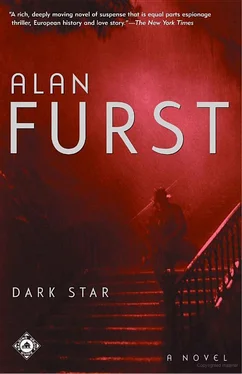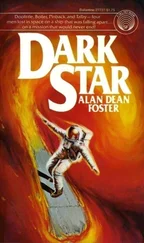Alan Furst - Dark Star
Здесь есть возможность читать онлайн «Alan Furst - Dark Star» весь текст электронной книги совершенно бесплатно (целиком полную версию без сокращений). В некоторых случаях можно слушать аудио, скачать через торрент в формате fb2 и присутствует краткое содержание. Жанр: Шпионский детектив, на английском языке. Описание произведения, (предисловие) а так же отзывы посетителей доступны на портале библиотеки ЛибКат.
- Название:Dark Star
- Автор:
- Жанр:
- Год:неизвестен
- ISBN:нет данных
- Рейтинг книги:3 / 5. Голосов: 1
-
Избранное:Добавить в избранное
- Отзывы:
-
Ваша оценка:
- 60
- 1
- 2
- 3
- 4
- 5
Dark Star: краткое содержание, описание и аннотация
Предлагаем к чтению аннотацию, описание, краткое содержание или предисловие (зависит от того, что написал сам автор книги «Dark Star»). Если вы не нашли необходимую информацию о книге — напишите в комментариях, мы постараемся отыскать её.
Dark Star — читать онлайн бесплатно полную книгу (весь текст) целиком
Ниже представлен текст книги, разбитый по страницам. Система сохранения места последней прочитанной страницы, позволяет с удобством читать онлайн бесплатно книгу «Dark Star», без необходимости каждый раз заново искать на чём Вы остановились. Поставьте закладку, и сможете в любой момент перейти на страницу, на которой закончили чтение.
Интервал:
Закладка:
Szara was a little stung at this. So you know about clandestine life, do you? “Well, one could hardly expect your monthly production figures to be published in trade magazines.”
“Unlikely.”
“It would be considerable.”
“Yes it would. In October, for example, we shipped to Rheinmetall approximately sixteen thousand eight hundred feet of 302 swage wire.”
Divide by four hundred and eighty, Szara calculated, and you have the monthly bomber production of the Reich. Though tanks would be of great interest, no number could so well inform Soviet military planners of German strategic intentions and capabilities.
Szara jotted down the number as though he were making notes for a feature story- our motto has always been excellence, Baumann claims. “Substantial,” he said, tapping his pencil against the number on the page. “Your efforts must surely be appreciated.”
“In certain ministries, that’s true.”
But not in others. Szara put the notebook and pencil in his pocket. “We journalists don’t often meet with such candor.”
“There are times when candor is called for.”
“Perhaps we’ll be meeting again,” Szara said.
Baumann nodded his assent, a stiff little bow: a man of dignity and culture had made a decision, taken honor into account, determined that greater considerations prevailed.
They went back to the office and chatted for a time. Szara restated his gratitude for a delightful evening. Baumann was gracious, saw him to his taxi when it arrived, smiled, shook hands, wished him safe journey home.
The taxi rattled along past brown factory walls. Szara closed his eyes. She stood at the center of the room, olive skin in half tones, pale breasts that rose and fell as she breathed. Marta Haecht, he thought.
Fate rules our lives. So the Slavs seemed to believe, and Szara had lived among them long enough to see the sense of the way they thought. One simply had to admire the fine hand of destiny, how it wove a life, tied desire to betrayal, ambition to envy, added idealism, love, false gods, missed trains, then pulled sharply on the threads, and behold! — there a human danced and struggled.
Here, he thought, was that exquisite deployment of fate known as the coincidence.
A man goes to Germany and is offered, simultaneously, both salvation for his aching soul and a guarantee of life itself. Amazing. What should such a man believe? For he can see that a clandestine affiliation with Dr. Baumann and his magic wire will make him so appetizing a fellow to the special services that they will keep him alive if the devil himself tries to snatch his ankle. As for his soul, well, he’d been having rather a bad time with it lately. A man whose friends are vanishing every day must learn to nuzzle death in order to keep his sanity-didn’t a kind of affection always take root in proximity? This is a man in trouble. A man who sits in a park in Ostend, offered, at least, a possibility of salvation, then stands and walks away in order to keep a timely appointment with those he has every reason to believe mean to abduct him-this man must need a reason to live. And if the reason to live is in Berlin? Tightly locked to the very means that will ensure survival?
Oh, a glorious coincidence.
In a vast and shifting universe, where stars glitter and die in endless night, one may choose to accept coincidence of every sort. Szara did.
There remained, amid such speculation, one gravely material difficulty, the Okhrana document, and the need to satisfy what he now believed to be a second group of masters-Renate Braun, General Bloch-within the intelligence apparat. For the Baumann assignment came, he was almost positive, from his traditional, longtime friends in the NKVD-the Foreign Department crowd, Abramov and others, some known, some forever in shadow.
Now, to stay alive, he would have to become an intelligence officer: an NKVD of one.
On the morning of 26 November, Szara filed as instructed at the Soviet embassy in Berlin. Not a dispatch, but the development of information that Nezhenko’s telegram had specified: Baumann’s age and demeanor, his wife, how they lived, the factory, the proud history. Not a word about swage wire, only “plays a crucial part in German rearmament production.”
And there had been only three for dinner. Marta Haecht he would not give them.
Had the apparat known what it was getting, Szara reasoned, they’d have sent real officers. No, this was somebody who’d been informed of a potential opportunity in Berlin, somebody who’d told his assistant, Oh send Szara up there, figuring he’d let them know if he came across something useful. That was the nature of the intelligence landscape as he understood it: in a world of perpetual night, a thousand signals flickered in the darkness, some would change the world, others were meaningless, or even dangerous. Not even an organization the size of the NKVD could examine them all, so now and then it called on a knowledgeable friend.
The people at the embassy had been told to expect him, they took his report without comment. Then they informed him he was to return to Moscow. On the Soviet merchant vessel Kolstroi, departing Rostock, on the Bay of Pomerania, at five in the afternoon on 30 November. That was four days away. Recall to Moscow. Szara had to fight for equilibrium. The phrase sometimes meant arrest; the request to return was polite enough, but once they had you back in the country … No. Not him, and not now. He could anticipate some fairly uncomfortable interrogations. By “friends” who would show up at his apartment bringing vodka and food-that was, at least, the usual method: so glad to have you back, you must tell us everything about your trip.
You really must.
He calmed himself down, decided not to think about it, and left the embassy with a pocket full of money and a determined heart, the twin pillars of espionage.
Were they watching him? The Foreign Department group? The Renate Braun group? He assumed they were-they’d certainly, thank God, been with him on the journey from Prague to Berlin. A lot of them.
He knew just enough, he thought, to lose a surveillance. Three hours it took-museums, train stations, department stores, taxis, trams, and restaurants with back doors. At last arriving, alone as far as he could tell, at an antiques store. Here he bought a painting, oil on canvas, dated 1909, in a heavy gilt frame. By one Professor Ebendorfer, the proprietor rather haughtily informed him, of the University of Heidelberg. A four-by-three-foot rectangle, the painting was executed in the Romantic style: a Greek youth, a shepherd, sat cross-legged at the foot of a broken column and played his pipe whilst his flock grazed nearby, a rich blue sky was studded with fleecy clouds, snow-capped mountains rose in the distance. Huldigung der Naxos, it was called- Homage to Naxos -and Professor Ebendorfer had signed it artfully in the lower right corner, on a laurel bush beset by a nibbling ram.
Back in the room at the narrow house, Szara went seriously to work, as he should have done all along.
And since he was not looking for anything in particular, simply performing a mechanical task that left his mind in a rather listless, neutral state, he eventually found everything. He immediately wished he hadn’t. It was poison he found: the knowledge that killed. But there it was. He’d meant only to leave the original dossier, which would not pass a Russian border inspection, in Berlin, and carry with him to Moscow a condensed document, in a personal shorthand, of facts and circumstances. Using a cipher of contemporary dates and meaningless cities for the ones in the dossier, he believed he could get it past the NKVD border guards as “journalist’s notes.” These guards were not at all the NKVD types who worked in foreign political affairs-they were thorough, uncorruptible, and dull. He could handle them.
Читать дальшеИнтервал:
Закладка:
Похожие книги на «Dark Star»
Представляем Вашему вниманию похожие книги на «Dark Star» списком для выбора. Мы отобрали схожую по названию и смыслу литературу в надежде предоставить читателям больше вариантов отыскать новые, интересные, ещё непрочитанные произведения.
Обсуждение, отзывы о книге «Dark Star» и просто собственные мнения читателей. Оставьте ваши комментарии, напишите, что Вы думаете о произведении, его смысле или главных героях. Укажите что конкретно понравилось, а что нет, и почему Вы так считаете.












